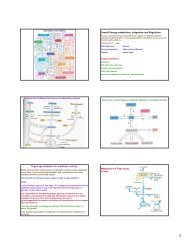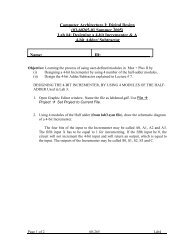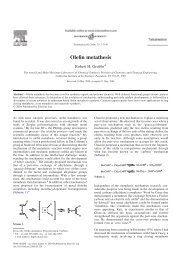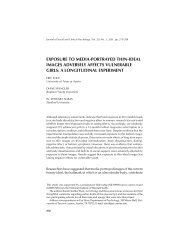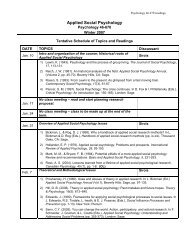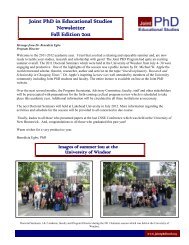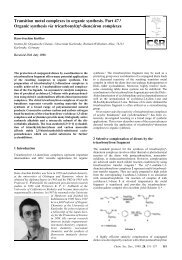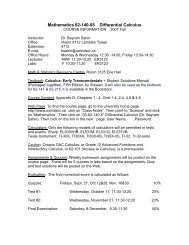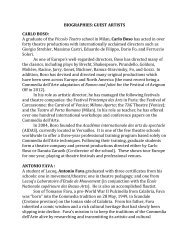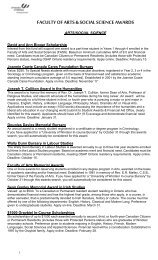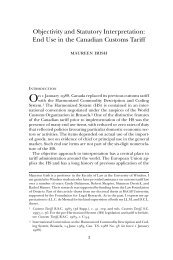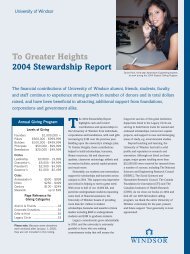Critical Social Work - University of Windsor
Critical Social Work - University of Windsor
Critical Social Work - University of Windsor
You also want an ePaper? Increase the reach of your titles
YUMPU automatically turns print PDFs into web optimized ePapers that Google loves.
Brown<br />
Mullaly, 1997, 2002, 2010; Shera 2003). Some social workers committed to social justice focus<br />
on postmodernism (Brown & Augusta-Scott, 2007a; Chambon & Irving, 1994; Chambon,<br />
Irving, & Epstein, 1999; Gormond, 1993; Healy, 2005; Pease & Fook, 1999; Pon, 2009; Sanda &<br />
Nuccio, 1992), critical social work (Carniol, 2000, Fook, 2002; Hick, Fook, & Pozzuto, 2005;<br />
Hick & Pozzuto, 2005; Pozzuto, Angell, & Dezendorf, 2005), or critical reflection (Fook,<br />
2002). Many focus their commitment to social justice in social work within political economy,<br />
the welfare state, and feminism (Leonard, 1997; McGrath, M<strong>of</strong>fatt, George, & Lee, 1999;<br />
McKeen, 2006, 2004; McKeen & Porter, 2003; Mosher, 2000; Neysmith, 2000). Yet, others<br />
address particular substantive issues through a lens committed to social justice such as disability<br />
(MacDonald, 2000), homelessness (Karabanow, 2004), pedagogy, (Campbell, 2002, 2003),<br />
research (Strier, 2006), queer theory (McPhail, 2004), and gender and the body (Brown, 1993,<br />
2007c, 2007d; Brown & Jasper, 1993a, 1993b; Brown, Weber, & Ali, 2008). Anti-oppressive<br />
social work practitioners draw increasingly on the field <strong>of</strong> narrative therapy with its postmodern,<br />
social constructionist, and critical approach (Brown & Augusta-Scott, 2007a, 2007b, Strong &<br />
Pare, 2003; White, 1991, 1997, 2001, 2003, 2004, 2007). While all these foci contribute to antioppression<br />
some describe their work through the language <strong>of</strong> social justice or critical social work<br />
language and some use the language interchangeably.<br />
Clearly, it is not possible to generalize comments on anti-oppressive practice to the broad<br />
range <strong>of</strong> work that seeks to advance social justice social work. I am, therefore, not suggesting<br />
that all conceptual practices <strong>of</strong> anti-oppressive or critical social work conceptual practices limit<br />
the scope <strong>of</strong> social justice. This article intends to contribute to the larger critical social work<br />
conversation as part <strong>of</strong> the process <strong>of</strong> “refining its theory and practice to address new tensions”<br />
(Baines, 2007, p.4). Extrapolating from the spirit <strong>of</strong> Fook’s (2002) notion <strong>of</strong> critical reflection<br />
toward examining our fundamental assumptions, my attention centers on examining the<br />
possibilities for establishing a both/and approach to anti-oppression and critical social work. By<br />
this I mean, addressing the complexities <strong>of</strong> modernist and postmodernist contributions to critical<br />
thought with an emphasis on questioning the modernist conceptualization <strong>of</strong> experience and the<br />
subject or self.<br />
Alongside Hick (2005) I argue, reflexive inquiry allows for the elaboration <strong>of</strong> how social<br />
life and experience are organized. “The intent is not to understand experience subjectively but<br />
rather reflexively. It would aim to uncover the social relations organizing people’s everyday<br />
experience. Both the social worker and the client are viewed as situated” (Hick, 2005, p.42).<br />
Similarly, Rossiter (2005) argues critical reflection emphasizes the development <strong>of</strong> theory from<br />
experience. She asks, ‘how do we critically problematise the very experience from which we<br />
draw our conclusions” (Rossiter, 2005, p. 3). <strong>Critical</strong> epistemological reflexivity will explore<br />
taken for granted assumptions about experience in this discussion. I will begin by exploring three<br />
conceptual limitations that can be observed in modernist or structural conceptual practices in<br />
social work: 1) the essentialism <strong>of</strong> the subject, 2) inadvertent subjectivism or writing out the<br />
social, and 3) the reproduction <strong>of</strong> dominant social discourse. Through exploring these related<br />
domains, like Hick and Pozzuto (2005), I will ultimately argue for a blending <strong>of</strong> modernist and<br />
postmodernist assumptions which holds onto the strengths <strong>of</strong> both modernism and<br />
postmodernism while abandoning their limitations. This critical reflexivity is intended “to avert<br />
as far as possible replicating oppressive social relations in practice” (Healy, 2005, p. 80).<br />
<strong>Critical</strong> <strong>Social</strong> <strong>Work</strong>, 2012 Vol. 13, No. 1<br />
36




